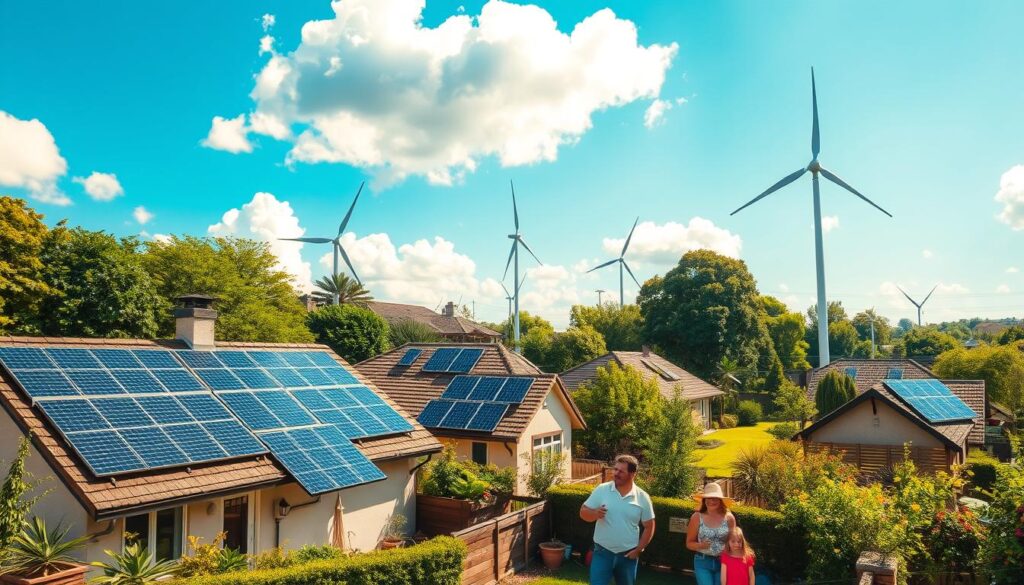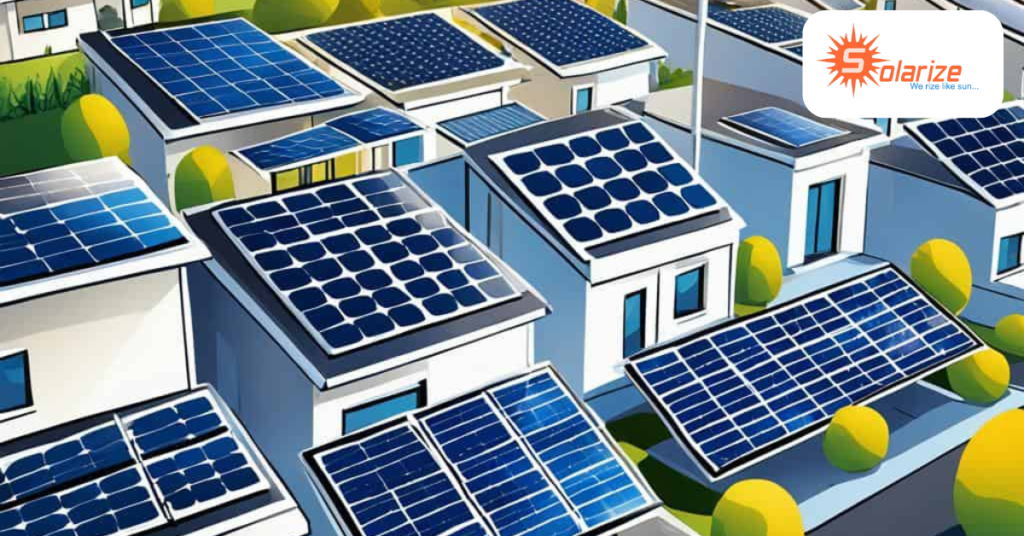Solar Panel Price: Find Affordable Clean Energy
In today’s world, we all want to be more sustainable and care for our planet. Solar power is a top choice for homes and businesses. It’s clean, renewable, and saves money compared to old energy sources. This article will help you understand solar panel costs and find the best deals for your place. learn through this article what is solar panel price .
Table of Contents
Key Takeaways
- Understanding the cost breakdown and factors affecting solar panel pricing is crucial for finding the most affordable solutions.
- Evaluating long-term savings, government incentives, and financing options can help make solar energy more accessible.
- Choosing the right solar panel system and working with a reputable installer are essential for maximizing the benefits of going solar.
- Solar energy can provide significant environmental and energy independence benefits for both homeowners and businesses.
- Comparing prices and exploring different financing options can help you find the most cost-effective solar panel solution for your needs.
Understanding the Cost of Solar Panels
When you think about solar power, knowing what affects the cost of solar panels is key. The price of solar panels depends on several things. These include panel efficiency, system size, installation costs, and where you live. By looking into these factors, you can make a wise choice about solar panels and see the long-term savings.
Factors Affecting Solar Panel Pricing
The price of solar panels changes a lot based on a few main things:
- Panel Efficiency: Better solar panels cost more but make more power. This can lead to bigger savings over time.
- System Size: The size of your solar system, in kilowatts (kW), affects the cost. Bigger systems cost more upfront but save more energy.
- Installation Costs: The cost to install your system includes labor and materials. Things like your roof and where you live can change this cost.
- Geographic Location: Where you are can also change the price of solar panels. This is because of local incentives, electricity rates, and labor costs.
Evaluating Long-Term Savings
The initial cost of solar panels might seem steep, but think about the long-term savings. Solar panel ROI is about comparing the total cost to the savings and incentives over time. This helps you see if solar panels are a good investment and how they can save you money in the long run.
“The key to understanding the cost of solar panels is to look beyond the initial price tag and consider the long-term financial benefits. With careful analysis, you can unlock significant savings and make a smart investment in renewable energy.”
Solar Panel Price: Breakdown and Averages
Installing a solar panel system is a big decision. The cost is a key factor to think about. Let’s look at the usual costs and what you might pay for this green investment.
The average solar panel cost for homes is between $15,000 and $25,000. This depends on your home’s size and how many panels you need. The price includes the panels, inverters, mounting gear, and the work to install it.
| Solar System Component | Average Cost |
|---|---|
| Solar Panels | $3,000 – $5,000 |
| Inverters | $1,000 – $2,000 |
| Mounting Hardware | $500 – $1,000 |
| Installation Labor | $3,000 – $5,000 |
Commercial solar setups cost more, ranging from $50,000 to $250,000 or more. This depends on the system’s size and the business’s energy needs. Big projects can get cheaper per watt because of their size.
“The cost of solar panels has dropped dramatically in recent years, making it a more accessible option for homeowners and businesses alike.”
The initial cost might seem high, but solar’s long-term savings and green benefits are worth it. Knowing the usual costs helps you choose the best solar option for your budget.
Choosing the Right Solar Panel System
Choosing between a residential or commercial solar panel system is key. Your property’s size and needs will guide your choice. Knowing the differences between these options helps you make a smart choice and get the most from your solar investment.
Residential vs. Commercial Solar Installations
Residential solar systems are for homes, townhouses, or small buildings. They are smaller and meet a household’s energy needs. On the other hand, commercial solar systems are bigger and for businesses or large buildings with more energy needs.
The design of residential and commercial solar systems differs. Residential systems often go on the roof. Commercial systems might use ground mounts or building-integrated solar to make the most of space and energy.
| Feature | Residential Solar | Commercial Solar |
|---|---|---|
| System Size | Typically 3-15 kW | Typically 50-1,000 kW |
| Panel Placement | Roof-mounted | Roof-mounted, ground-mounted, or building-integrated |
| Energy Needs | Household-scale | Commercial or industrial-scale |
| Financing Options | Homeowner loans, leases, power purchase agreements | Business loans, leases, power purchase agreements |
Whether you’re looking at residential solar or commercial solar, picking a trusted solar installer is crucial. They’ll assess your energy needs and design a system that boosts your investment return.
Government Incentives and Tax Credits
Investing in solar panels can be costly, but there are government incentives and tax credits to help. These programs are at both the federal and state levels. They aim to encourage using renewable energy and make solar power more affordable for everyone.
Federal and State Solar Rebates
The federal solar investment tax credit (ITC) is a big help. It lets homeowners deduct part of their solar panel costs from their taxes. Right now, you can get up to 26% back, but this will change in the future. Many states also offer solar rebates to lower the initial cost of solar panels.
- The federal solar tax credit can save you up to 26% on the total cost of your solar panel system.
- Numerous states offer solar rebates and incentives that can further decrease your out-of-pocket expenses.
- These state-level programs vary in structure and amount, so it’s important to research the options available in your area.
To use these solar panel tax credits, solar rebates, and solar incentives, you need to know the rules of your state solar programs. By using these government benefits, you can greatly lower the cost of switching to clean energy.

Going solar isn’t just good for the environment – it can also save you a significant amount of money in the long run. Take the time to explore the various government incentives and tax credits available to you.”
Exploring Financing Options for Solar Panels
Installing solar panels can be expensive for many. But, there are ways to make solar power more affordable. Let’s look at the main financing options and their benefits.
Solar Loans
Solar loans help you finance your solar panel system. You buy the system outright and own it from the start. These loans have good interest rates and flexible payment plans. They’re a top choice for those looking to save money in the long run.
Solar Leasing and Power Purchase Agreements (PPAs)
Solar leasing and power purchase agreements (PPAs) are other financing options. With leasing, you pay a monthly fee to the provider, who owns and maintains the system. PPAs let you buy electricity at a set rate without the initial cost.
- Leasing and PPAs are great for those avoiding upfront costs or maintenance.
- They require little to no money down, making solar energy more available.
When looking at solar financing, it’s key to compare options and understand their pros and cons. This helps you choose the best for your energy needs and budget. By knowing your options, you can move towards a greener, more efficient future.
“Solar financing unlocks the door to clean energy for many homeowners and businesses who may have otherwise been priced out of the market. It’s a game-changer for the solar industry.”
Calculating Your Return on Investment
When thinking about solar panels, it’s key to look at the long-term money benefits. The solar panel ROI and solar payback period are important to check. They help figure out if solar is a good choice for you. By looking at long-term solar savings, you can decide if solar is worth it.
Payback Period and Long-Term Savings
The payback period for solar panels is how long it takes to get your money back from energy savings. This time can change based on where you live, the cost of panels, and local electricity prices. In the U.S., the solar payback period is usually 8 to 15 years.
After the payback period, the long-term solar savings can be big. Over 25 to 30 years, you could save thousands on your bills. These savings can help cover the cost of solar panels, making it a smart long-term choice.
| Metric | Average Value |
|---|---|
| Solar Payback Period | 8-15 years |
| Long-Term Solar Savings | $10,000 – $30,000+ |
By looking at the solar panel ROI, solar payback period, and long-term solar savings, you can make a smart choice. This helps you decide if solar is right for your home or business
The Benefits of Going Solar
Switching to solar energy offers many benefits beyond saving money. It lets homeowners and businesses make a real difference for the planet. They also gain more control over their energy use.
Environmental Impact and Energy Independence
Solar energy is great for the environment. It’s clean and doesn’t release harmful gases, helping fight climate change. Plus, it makes users less dependent on expensive, unreliable energy sources.
- Solar energy is a sustainable, emissions-free power source that helps combat climate change.
- Transitioning to solar reduces dependence on non-renewable energy, increasing energy independence.
- Solar power provides a stable, predictable energy source, insulating users from price fluctuations in the fossil fuel market.
The benefits of solar energy for the planet and our energy security are obvious. By choosing solar, we help create a greener future. We also ensure our energy needs are met.
| Benefit | Description |
|---|---|
| Environmental Impact | Solar power generates electricity without producing greenhouse gas emissions, reducing the carbon footprint and mitigating climate change. |
| Energy Independence | Solar energy reduces reliance on traditional, non-renewable energy sources, providing a stable and reliable power supply. |
| Cost Savings | The long-term cost savings of solar energy can offset the initial investment, making it a financially attractive option. |
Solar Panel Price: Comparison Shopping
When looking for affordable solar panels, it’s important to shop around. Looking at different prices and what each offers can help you find the best deal. Here are some tips to compare solar panel prices and choose wisely.
Evaluating Solar Panel Quotes
Start by getting quotes from several solar companies. Look at the solar panel cost from each, considering things like:
- Equipment quality and efficiency
- Warranty coverage
- Installation costs
- Financing options and incentives
Make sure to check each quote carefully to find the best deal.

